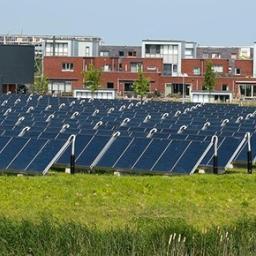The Netherlands in a sustainable world
The world is too small to simultaneously produce enough food (including meat) for everyone and to deliver biofuels on a large enough scale to slow down climate change and maintain biodiversity. The Netherlands in a Sustainable World (second sustainability outlook) presents sufficient options for fighting poverty, tackling climate change and limiting the loss of biodiversity. The costs of these options can be limited to a few percent of GDP in 2040. However this will only be possible with coordinated international policies.
Poverty reduction, climate change and biodiversity loss to be tackled as an integrated global problem
The Netherlands in a Sustainable World describes the trends and policy options pursued in achieving internationally agreed objectives for development, climate change and biodiversity. The Baseline scenario up to 2040 published by the OECD was used here. A baseline scenario however assumes no additional policies, such as the recently agreed EU climate policy. This outlook therefore also includes an inventory of additional policy options for working towards the objectives, such as:
- long term investments in the poorest countries in infrastructure in the broadest sense of the word: education, drinking water, sanitation, health care, roads, energy, etc.
- abolishing agricultural subsidies with phased up opening up of markets in developing countries;
- broadening the European emission trading system for greenhouse gasses to other countries, including the emerging economies (China, India, Russia);
- lowering expectations the contribution biofuels can make to the EU targets, taking into account the negative impacts on food and biodiversity;
- raise agricultural productivity, particularly in developing countries;
- influence diet patterns by encouraging a decrease in meat intake;
- targeted protection of ecosystems, particularly in tropical regions.
The policy options identified are then analysed from the perspective of different world views.
A finite world
The study concludes that the world is too small to simultaneously produce enough food (including meat included) for everyone while at the same time and to deliver biofuels on a large enough scale to slow down climate change and maintain biodiversity. Further economic development, particularly of the richer countries and the emerging economies of China, India and Brazil, will be at the expense of biodiversity and will lead to further climate change. The sustainability issues covered in this report - development, climate change and biodiversity loss - are all closely interconnected, both in terms of causes and potential solutions. For example, socio-economic development of the poorest developing countries will lead to less poverty and famine, and in time, to lower rates of population growth, but also to higher levels of consumption and, consequently, to rising energy use and expanding land use, which in turn drive further climate change and loss of biodiversity.
Coordinated international action
Reducing poverty, tackling climate change and reducing biodiversity loss to a minimum will only be possible with coordinated international policies. This is necessary to realise most of the options mentioned earlier. Sustainability issues need to be tackled not only through robust international policies, but also through an integrated approach as well. Development policies have consequences for biodiversity and climate change, and vice versa. Policies for energy, agriculture, trade, biodiversity and development cooperation should therefore be integrated. In pursuing this aim, the Netherlands should, via the European Union, promote a coalition of large countries, including rapidly growing economies.
More information
English translation of a book published in november 2007.
Auteurs
Kenmerken
- Publicatietitel
- The Netherlands in a sustainable world
- Publicatiedatum
- 17 Juli 2008
- Publicatie type
- Publication
- Publicatietaal
- Engels
- Productnummer
- 44
